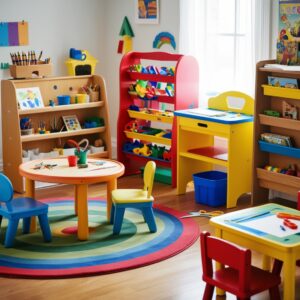Helping children develop independence is an essential part of parenting. By fostering self-reliance, you prepare your little one for future challenges and encourage them to build confidence, problem-solving skills, and emotional resilience. While every child develops at their own pace, parents play a crucial role in guiding and supporting this journey toward independence.
Why Independence Matters
Self-esteem is higher in independent children; they make better decisions, and they adapt more smoothly into new situations. These social relationship skills, school environments, and eventually adulthood are all enhanced through the encouragement of independence in your child. By giving your child independence, you give them the tools to become competent and capable in an opportunistic and challenging world.

Encouraging Strategies
1. Assign Small Tasks Appropriate for Their Age
Start with simple responsibilities based on your child’s age. For example, let your toddler put away his or her toys and your preschooler help with setting the table. Completion of a task gives them a feeling of accomplishment.
Pro Tip: Reinforce with positive remarks, such as “You did that all by yourself!”
2 Create a Structured Routine.
Children thrive on routine. Establish a daily schedule that includes activities that they can do on their own, such as brushing teeth, picking out clothes, or packing their school bags. Routines teach them time management and responsibility.

3. Encourage Decision-Making Skills
Give your child choices. Let them choose between two foods or clothing, for example. Giving them small choices in life builds confidence and teaches them about the consequences of their decisions.
Pro Tip: Do not present them with too many options, which may frustrate them.
Encouraging Problem-Solving
4. Encourage Them to Try First
If your child is having a problem with something, do not immediately jump in to fix it for them. Instead, walk them through the process by asking open-ended questions such as, “What do you think we should do?” This encourages critical thinking and problem-solving skills.
5. Praise Mistakes
Make sure your youngster understands that making errors is a necessary part of learning. When they spill milk or misplace a toy, use these moments to show them how they can rectify the situation and do better next time.

Building Confidence Through Independence
6. Support Their Passions and Interests
Encourage your little one to explore activities they enjoy, be it painting, building blocks, or gardening. These hobbies give them a sense of ownership and pride in their abilities.
7. Praise Effort Over Results
Pay more attention to the effort your child puts into things rather than the result. Rather than stating, “You’re so smart,” for instance, you may add, “I’m proud of how hard you worked on that puzzle.”
Setting Boundaries and Offering Guidance
8. Clearly Set the Expectations
While encouraging them to be independent, it’s also necessary to draw a line of boundaries. For instance, teach them to clean up after playing, and explain the importance of cleanliness of places.
9. Guide Without Taking Over
At times, guide or give suggestions but ultimately let the child take the lead. For instance, if he/she is finding it difficult to tie his shoelaces, show him/her once and then let him practice.
The Role of Parents in Developing Independence
10. Be Patient and Consistent
Learning independence takes time and repetition. Celebrate small milestones and remain patient as your child gradually masters new skills.
11. Create a Safe Environment
Ensure your home is child-friendly, with tools and spaces that support their independence. For example, provide step stools in the bathroom or organize toys at a reachable height.

Encouraging your little one to be independent is all about the journey, really, with patience, persistence, and creativity. By entrusting him with age-specific tasks, encouraging decision-making, and celebrating his endeavors, you are setting the path for your child to grow into a confident and competent individual. Remember, guide them rather than rush them, since every step they take toward their independence means a step ahead toward a brighter future.



